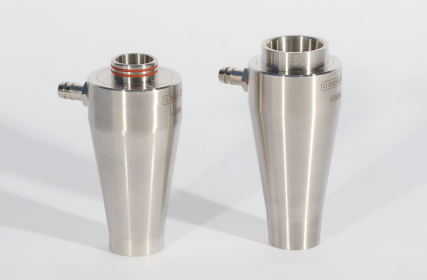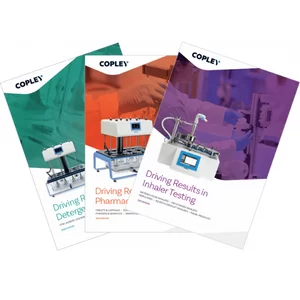6 November 2018; Nottingham, UK: Copley Scientific is closing a year of innovation and renewal across the inhaled product testing range with two upgrades that further enhance routine analysis: a new Mixing Inlet and a firmware update for the TPK™ 2100 Critical Flow Controller. The Mixing Inlet allows application of a patient-representative inhalation profile during aerodynamic particle size distribution (APSD) measurement and is used to achieve better in vitro in vivo correlations (IVIVCs). The new, one-piece, all 316 stainless steel construction is designed to be more robust and chemically inert for the drug recovery process. The TPK™ 2100 Critical Flow Controller is a key accessory for flow rate control in dry powder inhaler testing (DPI) that now offers enhanced logging and recording capabilities as a result of the latest firmware update (Version 2.00). Find out more about both products by contacting: sales@copleyscientific.co.uk
The APSD of inhaled products is a Critical Quality Attribute, measured using a cascade impactor, typically either the Andersen Cascade Impactor (ACI) or Next Generation Impactor (NGI). Cascade impactors are precision instruments that operate at a constant volumetric air flow rate. The Mixing Inlet decouples flow through the test product from that entering the impactor making it possible to apply a clinically realistic inhalation profile during measurement while meeting the constraint of constant flow, at a calibrated rate, at the inlet to the impactor.
Available in both ACI and NGI versions, the new Mixing Inlet has a 316 stainless steel construction to aid drug recovery and optimise drug/solvent compatibility. A one-piece, rigid design offers enhanced induction port support and protects the sharp edge of the inner cone from damage; the avoidance of internal ‘O’ rings also eliminates a potential source of leaks. By gently mixing sample-laden air with any supplementary air required, the Mixing Inlet produces a homogeneous test flow for the impactor, while minimising internal drug losses.
The key function of the TPK™ 2100 is to control the air flow entering the impactor for DPIs, ensuring stable, critical flow and a defined pressure drop across the inhaler – 4 kPa when applying compendial test methods. This pressure drop (P1) is now recorded and logged for every test providing a traceable record of compliance and correct inhaler operation. This additional functionality further boosts the utility of the TPK™ 2100; existing units can be upgraded to the latest software version for a fee.
To see Copley’s full range of equipment for inhaled drug testing download “Quality Solutions for Inhaler Testing” from http://www.copleyscientific.com/downloads/brochures.

CAPTION: The new Mixing Inlet is a robust accessory for the more clinically realistic measurement of APSD by cascade impaction.
About Copley Scientific
Copley Scientific is widely recognised as the world’s leading manufacturer and supplier of inhaler test equipment and is a major provider of testing systems for other pharmaceutical dosage forms. The company also supplies equipment for detergent testing.
Copley Scientific’s pharmaceutical product range includes test equipment for all types of orally inhaled and nasal drug products – metered-dose inhalers, dry powder inhalers, nebulizers and nasal sprays – with a particular focus on solutions for delivered dose uniformity and aerodynamic particle size distribution measurement. It also includes testers for tablets (dissolution, disintegration, friability and hardness) capsules, powders, suppositories, semisolids and transdermals.
Used from R&D through to QC, this extensive range of equipment is supported by a full validation and aftersales service. Copley Scientific has offices in the UK and Switzerland and works in partnership with aerosol particle science experts MSP Corporation in North America; specialist distributors extend localised support across the world. This network provides expert help and training to every customer, directly enhancing the application of all Copley Scientific products.







